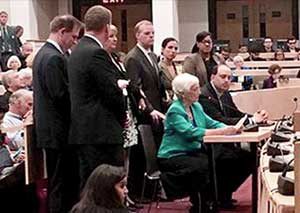
State lawmakers testified last week in favor of S834, An Act Reforming Pretrial Process, a bill that, according to its supporters, addresses questionable practices inherent in the current bail system.
By State Senator Pat Jehlen
(The opinions and views expressed in the commentaries and letters to the Editor of The Somerville Times belong solely to the authors and do not reflect the views or opinions of The Somerville Times, its staff or publishers)
Last week I joined many other legislators to testify on criminal justice reform. This is my testimony on S834, An Act Reforming Pretrial Process.
There are two problems with our bail system:
It locks up thousands of people who aren’t flight risks.
It doesn’t ensure that people let out on bail actually show up for court.
In almost every county, there are more people incarcerated awaiting trial than have been tried and sentenced. In both the Department of Correction and Middlesex County, the number of pretrial detainees has increased 23% in recent years.
County and state facilities hold roughly 5000 people every day awaiting trial – 25% of the incarcerated population. The pretrial incarceration system costs roughly $200 million annually.
It also results in significant harm for individuals, who after even a short incarceration lose their jobs, and sometimes their economic futures, their homes, and their families.
At the same time, our current bail system has a high rate of defendants who don’t show up in court.
Our system of bail is largely cash based: a defendant must pay a set amount of cash to obtain release. It doesn’t reflect current research on what makes a successful pre-trial system.
If people who are ordered to pay cash bail don’t have access to cash, they can’t be released. For wealthy people, cash bail is not a barrier; for poor people it is.
Availability of money shouldn’t determine if someone is released from jail before trial. Wealth shouldn’t play a role in our criminal justice system.
As Rep. Livingstone testified from his experience, decisions on bail are made with minimal information.
The late Senator Donnelly, along with Rep. Rogers and Rep. Livingstone, filed this bill to implement proven reforms. It provides for risk informed decision-making combined with better release conditions, moving us to a system with objective procedures.
Reforms include: Developing a validated risk-assessment tool to predict a defendant’s probability of returning to court; a limitation on cash bail unless it’s the only appropriate condition; services for pretrial defendants; and data collection.
This bill would provide informed and objective decision-making, court access to information, and assistance and oversight for released defendants.
Similar Reforms have been implemented in dozens of counties, the District of Columbia and six states. They have led to significant reductions in incarceration of defendants before trial as well as increases in appearance rates at courts.
Recently, I met with members of the Greater Boston Interfaith Organization in Cambridge and Winchester, who advocated strongly for many criminal justice reforms. I was happy to see so many of them at the hearing.















Another idea would be to issue tracking bracelets instead of keeping them locked up. Once they show up to court, the bracelet is removed. That way if they flee or don’t show up to court, they can be tracked down. The cost of that should be cheaper than having to pay to keep them in jail until they can be tried.
I realize this isn’t foolproof, but if someone really isn’t a flight risk they wouldn’t have a problem with it, especially if it keeps them from being locked up. Besides, you wouldn’t let someone out if you’re pretty sure they ARE a flight risk.
The problem with our justice system is that it’s a “one size fits all” system, and that can never work for everyone.